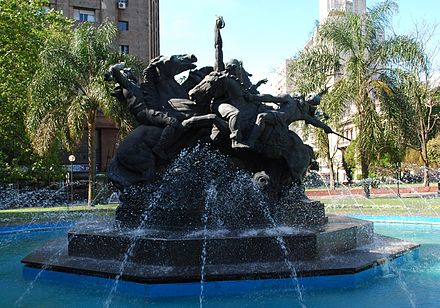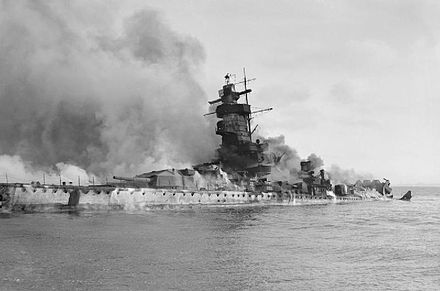Portal:Uruguay
| Portal | Participants | Templates | Tasks | Assessment | Popular Pages | Requests |
The Uruguay Portal
Uruguay (/ˈjʊərəɡwaɪ/ ⓘ YOOR-ə-gwy, Spanish: [uɾuˈɣwaj] ⓘ), officially the Oriental Republic of Uruguay (Spanish: República Oriental del Uruguay), is a country in South America. It shares borders with Argentina to its west and southwest and Brazil to its north and northeast, while bordering the Río de la Plata to the south and the Atlantic ocean to the southeast. It is part of the Southern Cone region of South America. Uruguay covers an area of approximately 176,215 square kilometres (68,037 sq mi) and has a population of around 3.4 million, of whom nearly 2 million live in the metropolitan area of its capital and largest city, Montevideo. The area that became Uruguay was first inhabited by groups of hunter–gatherers 13,000 years ago. The predominant tribe at the moment of the arrival of Europeans was the Charrúa people, while there were also other tribes, such as the Guaraní and the Chaná, when the Portuguese first established Colónia do Sacramento in 1680; Uruguay was colonized by Europeans later than its neighboring countries. The Spanish founded Montevideo as a military stronghold in the early 18th century due competing claims over the region, while Uruguay won its independence between 1811 and 1828, following a four-way struggle between Portugal and Spain, and later Argentina and Brazil. It remained subject to foreign influence and intervention throughout the 19th century, with the military playing a recurring role in domestic politics. A series of economic crises and the political repression against left-wing guerrilla activity in the late 1960s and early 1970s put an end to a democratic period that had begun in the late 19th century, culminating in the 1973 coup d'état, which established a civic-military dictatorship. The military government persecuted leftists, socialists, and political opponents, resulting in deaths and numerous instances of torture by the military; the military relinquished power to a civilian government in 1985. Uruguay is today a democratic constitutional republic, with a president who serves as both head of state and head of government. Uruguay is ranked first in the Americas for democracy, and first in South America in peace, low perception of corruption, and e-government. It is the lowest-ranking South American nation in the Global Terrorism Index, and ranks second in South America on economic freedom, income equality, per capita income, and inflows of FDI. Uruguay is ranked third on the continent in terms of Human Development Index, GDP growth, innovation, and infrastructure. Uruguay is regarded as one of the most socially progressive countries in Latin America. It ranks high on global measures of personal rights, tolerance, democracy, and inclusion issues, including its acceptance of the LGBT community. The country has fully legalized cannabis (the first country in the world to do so) as well as same-sex marriage, prostitution, and abortion. It is a founding member of the United Nations, OAS, and Mercosur. (Full article...) Selected article -Uruguay is the only country in Latin America that has achieved quasi-universal coverage of access to safe drinking water supply and adequate sanitation. Water service quality is considered good, with practically all localities in Uruguay receiving disinfected water on a continuous basis. 70% of wastewater collected by the national utility was treated. Given these achievements, the government's priority is to improve the efficiency of services and to expand access to sewerage, where appropriate, in areas where on-site sanitation is used. The stability of the water supply in Uruguay was severely challenged by a three year drought culminating in a water crises in 2022-2023. The La Niña driven cycle of drought, amplified by increased heatwaves caused by climate change meant that overuse of water by consumers stressed capacity of the system, leading to use of saltwater in drinking water. (Full article...)Selected picture - Estadio Centernario is a stadium in Montevideo, Uruguay (34.8945° S, 56.1527° W) used primarily for football. Built with a capacity of 100,000 not only to host several matches in the inaugural 1930 FIFA World Cup, including the final which was won by hosts Uruguay. Did you know -
CategoriesSelect [►] to view subcategories
People -
Juan Zorrilla de San Martín (28 December 1855 – 3 November 1931) was an Uruguayan epic poet and political figure. He is referred to as the "National Poet of Uruguay". (Full article...)
General imagesThe following are images from various Uruguay-related articles on Wikipedia.
Related portalsTopicsRecognized content
Featured articlesGood articlesAssociated WikimediaThe following Wikimedia Foundation sister projects provide more on this subject:
Award
Things you can do
Articles that need AttentionDiscover Wikipedia using portals | |||||||||||














.jpg/440px-Cerro_de_Montevideo_desde_la_ciudad._Año_1865_(no_watermark).jpg)




.jpg/440px-Eisenhower_en_Uruguay_(5096971783).jpg)



























